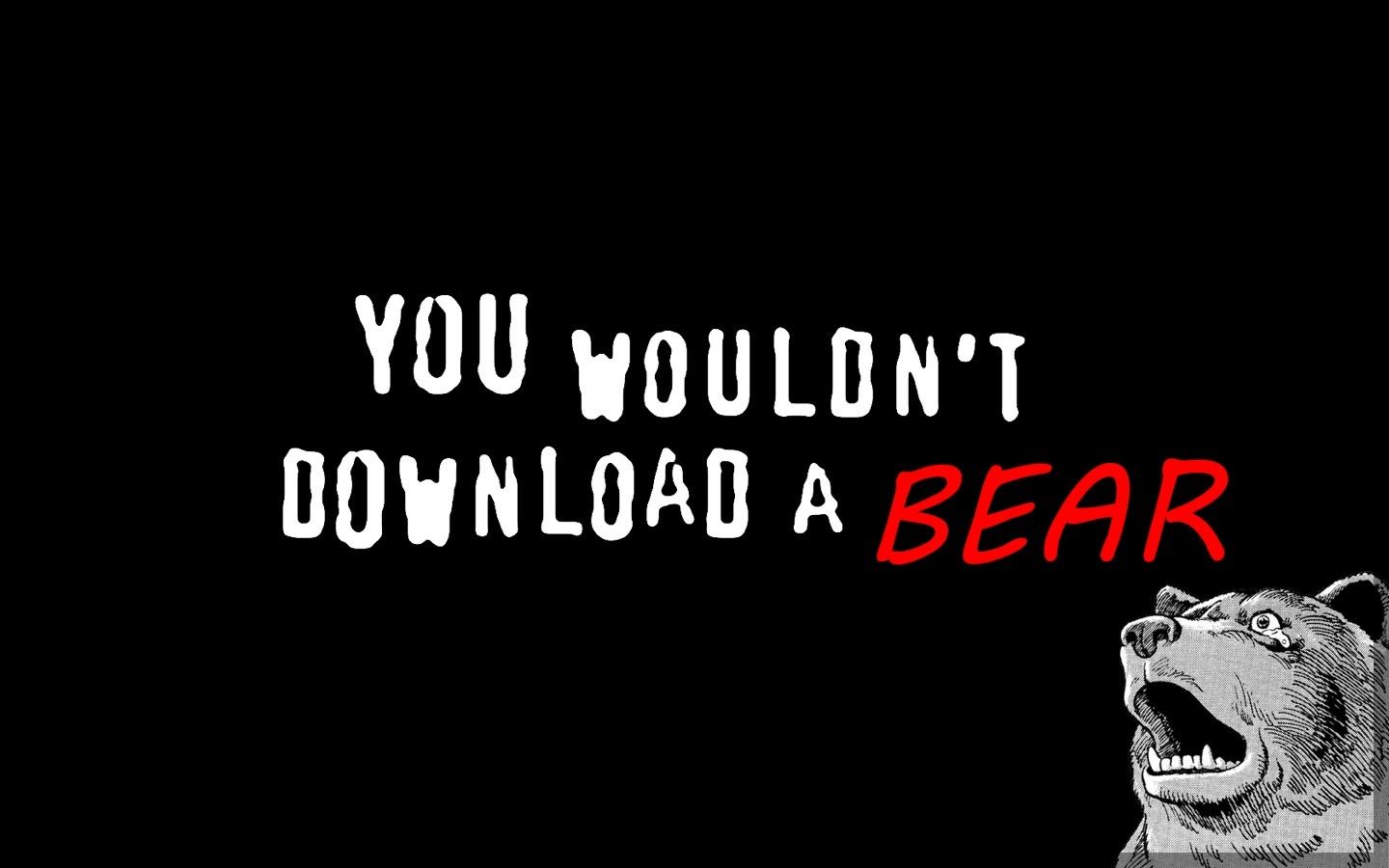It’s not.
But It is more like that ad - ridiculous and far fetched.
To make it clear to all of you who may already want to lynch me - I do not condone any act of piracy nor am I suggesting that I partake in the action itself; I do think it is illegal and in most cases is damaging for the industry. No, what I want to do is make people more aware of their arguments that equate piracy to theft.
In a discussion pertaining to piracy in modern media the ‘Piracy is theft’ argument is a terrible rebuttal. It’s akin to Mr. Garrisons’ “Drugs are bad. Mmkaay” only that in its self has a greater foundation of accuracy (see: drugs can be very bad for you and I'm not condoning them). If you know yourself to be such an individual then take this brief pause to slap yourself hard across the face.
… because you’re an idiot.
I’d like to think that any individual using the noun “piracy” and [p.e] abstract noun “theft” in the same sentence are speaking of the swashbuckling and nautical eras of history. But I’d know I'm lying to myself because they aren't They are, in fact, using a redundant argument that’s formed mainly from a moral standing. And morals are essential. They’re important things to have in order for people to be upstanding honest citizens of their respective societies. Yay for morals! But you’ll need to check that your morals aren't failing to differentiate two very separate actions.
So why is the argument ‘Piracy is theft’ not a good one?
Simple. When you use this argument you are stating that if one was to make a copy of a game, in this instance, they are in fact taking someone’s “original copy” and depriving them of it. This is just not the case.
In order to better understand the semantics let us look at this very informative pictogram:

Now, with all seriousness, let's look at a few legal definitions:
Type the following, ‘Digital Piracy’, ‘Online Piracy’ into the search bar and it will redirect you to the ‘Copyright Infringement’ page meaning only one thing - there is a legal term specifically dedicated to this subject that we should clearly be making greater use of.
“Copyright infringement is the unauthorized use of works under copyright, infringing the copyright holder's "exclusive rights", such as the right to reproduce, distribute, display or perform the copyrighted work, spread the information contained within copyrighted works, or to make derivative works.”
However it doesn't really instil any parallel level of “fear” as the latter and more commonly used titles. Nevertheless there are concise explanations of the correct terminology for ‘piracy’ and its evolution from traditional meaning: “copyright infringement intentionally committed for financial gain […]” to a more broadly used term for today i.e. “[…] copyright infringement, particularly in relation to peer-to-peer file sharing networks […]”. More importantly to my post is the section sub-headed “Theft”.
In copyright law infringement of a copyright holder’s property does not “refer to the theft of physical objects that take away the owner’s possession” but in fact illustrates “where a person exercises one of the rights of the copyright holder without authorization.”
Distinctions have been made by courts to clarify and differentiate copyright infringement and theft holding with a specific case sited; essentially the courts ruled that whilst the copyright holder’s exclusive rights were invaded, there was “no control, physical or otherwise, [is] taken over the copyright, nor is the copyright holder wholly deprived of using the copyrighted work or exercising the exclusive rights held.”
Frankly I think I could stop there but I can’t because I'm sure many of you wouldn't consider this source decent enough. So I’ll have to present my case further.
To save ourselves some time click ‘CTRL+F’ then type ‘theft’ and repeat this process with every hyperlink on the left side. Oh look! 0 of 0 can be found.
This is the United Kingdom’s Copyright homepage. You can purchase a copyright to your terrible interpretive wax art model of Edward Cullen here! And even they don’t connect the two.
What this boils down to is this; if I broke in to your car tonight and with great skill hot-wired and drove away with it then poor you would be left in the morning to discover my evening hijinks, and more importantly, you no longer have a car. If, however, I copied a game or downloaded a movie/song for personal consumption, I have not in any way been able to obtain and take away the master copy from Universal or FOX and they are not without. Unlike you who now has to walk to work. SUCKER!
But my argument isn't new and it has certainly been made better by more capable and well informed individuals. Observe infidels!
Why it’s wrong to call copyright infringement “theft” – this was posted by Mathew Ingram on Gigaom.com and explains many key points such as intellectual property not being like any other kind of property. It also highlights the issues that “theft” ignores when used such as “fair use” and just generally talks about the grey areas in copyright infringement. Of which there are a lot - unlike “theft”.
Why It's Important Not To Call Copyright Infringement Theft – posted on techdirt.com, Mike Masnick looks at both sides of the coin but still endeavours to distinguish misnomers and the reductive results of lumping “theft” into the category of “copyright infringement”. Two years later he continues his argument against the word with citations from an OpEd in The New York Times by law professor Stuart Green - NYTimes OpEd Explains Why Infringement Isn't Theft
“For Caveman Bob to “steal” from Caveman Joe meant that Bob had taken something of value from Joe — say, his favourite club — and that Joe, crucially, no longer had it […]defined as a zero-sum game: what Bob gained, Joe lost.”
To what it is now:
“When Industrial Age Bob and Joe started inventing less tangible things […] electricity, stocks, bonds and licenses, however, things got more complicated. What Bob took, Joe, in some sense, still had.”
Copyright.gov and clickandcopyrighty.com use similar if not the same phrasing and terminology to explain for us plebs the exact understanding of “copyright infringement” with regards to industry, and not once does it relate the act of theft, or stealing for that matter, to the concept of copyright infringement.
I want to briefly go back to the wiki entry because it mentions ‘theft’ as more of a colloquial term used for hyperbolic effect. Now if one was to use ‘theft’ as hyperbole that would be a more acceptable context since we know how damaging copyright infringement/piracy really is... except even then since we have this knowledge it’s still a redundant word to use.
Your strong hyperbolic claim doesn't need to be used for emphasis given that the very nature of the conversation is riddled with strong opposing thoughts and controversial opinions. And besides if you aren't meant to take the hyperbole claim literally, then why not just call a donkey a donkey instead of a *very very small horse like thing!
 |
| *I actually goolged that. |
Having said that, what this researching for this post has made me realize more than anything is that semantics play a large part in this ongoing discourse.
What I mean is the weight and gravity brought to this subject matter is made greater through the use of the word ‘theft’ rather than ‘infringement’. “Thou shall not infringe!” doesn't make the same waves as “Thou shall not steal” – which clearly strikes deeper. But if your aim is to win an argument through hyperbolic declamatory and sensationalist wording then you’re no better than The Sun.
Yet it’s important to remember that even then this goes beyond semantics into very grey territory that is filled with too many complexities to be blanketed by the term ‘theft’. The dispute is there because we are trying to understand what it is to us and how it affects the society we co-inhabit seeing as we are all indirectly or directly involved.
By all means say piracy is wrong, declare it’s bad, verbalize your cemented vitriol about how it is damaging to the industry and content creators. But please for the sake of me not stealing your car to make my point more real to you, just stop using “theft”.
[Post Edit - Thanks to a eagle eyed reader for pointing out grammatical error]
[Post Edit - Thanks to a eagle eyed reader for pointing out grammatical error]
'Theft' is an abstract noun, not an adjective. May want to amend that.
ReplyDeleteHahah, thanks for spotting that. Lazy writing. Cheers!
Delete